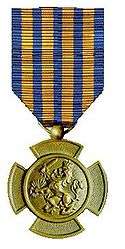Bronze Lion
| Bronze Lion | |
|---|---|
|
The Bronze Lion | |
|
Awarded by | |
| Type | Military award |
| Awarded for | Deeds of extreme bravery and leadership in battle favouring the Netherlands |
| Status | Currently awarded |
| Statistics | |
| First awarded | 1944 |
| Last awarded | 2009 (Björn Peterse, posthumous) |
| Total awarded | 1212 |
| Posthumous awards | Posthumous awards are possible |
| Precedence | |
| Next (higher) | Order of the House of Orange |
| Equivalent | Honorable Mention |
| Next (lower) | Resistance Star East Asia |
|
Ribbon bar of the Bronze Lion | |
The Bronze Lion (Dutch: Bronzen Leeuw) is a high Royal Dutch award, intended for servicemen who have shown extreme bravery and leadership in battle favouring The Netherlands; in some special cases it can however be awarded to Dutch or foreign civilians. It was first created in 1944 and has since been issued 1210 times. Proposals for an award are reviewed by the Dutch Board for Bravery Awards, which is part of the ministry of Defence. If awarded they are enforced by a Royal Decree. The Bronze Lion has precedence after the Order of the House of Orange, but is the second highest military decoration still being awarded for bravery (only preceded by the Military William Order).
Design
The Bronze Lion is a cross in bronze, covered by a round shield. On the front is a relief of the crowned Dutch Lion. The cross is attached to a 37 millimetre wide ribbon, divided into nine equal vertical stripes, alternately orange and 'Nassau blue', the strips on either edge are Nassau blue. It is possible for a single person to receive more than one award of the Bronze Lion, in which case a number '2' in gold is added on the ribbon of the Bronze Lion.
Last awarded
On Wednesday 31 May 2006, Queen Beatrix of the Netherlands posthumously awarded the late Major General Stanisław Sosabowski, commander of the 1st (Polish) Independent Parachute Brigade, the Bronze Lion for his services in Operation Market Garden in 1944.
On Wednesday 7 October 2009, two Dutch soldiers were awarded the medal: commando Björn Peterse (posthumously awarded) and Captain Gijs Tuinman, for their actions in Afghanistan
References
- Bronze Lion - Official website
- Bronze Lion - Ministry of Defence
- Vereniging DMD - Website of the organization of veterans with the Bronze Lion (Dutch)
